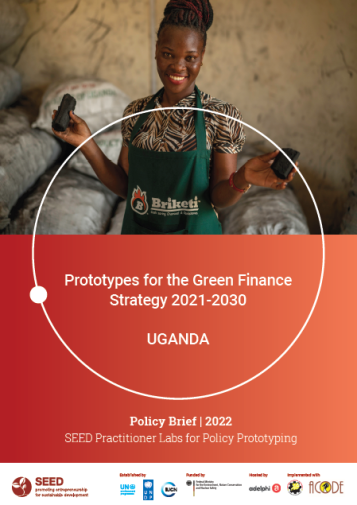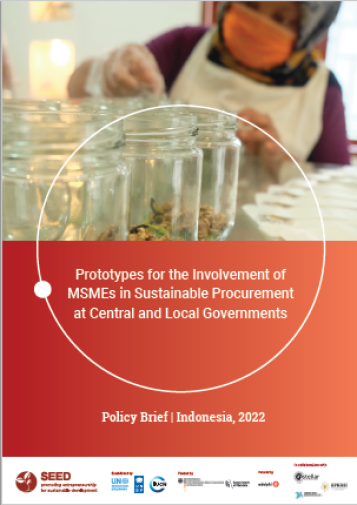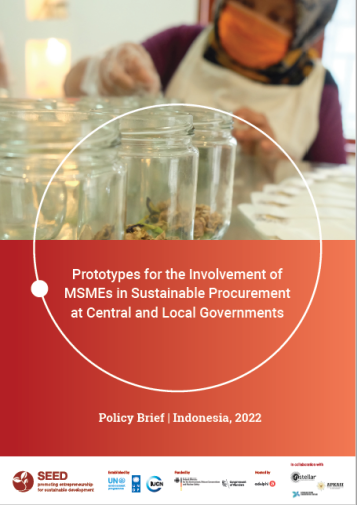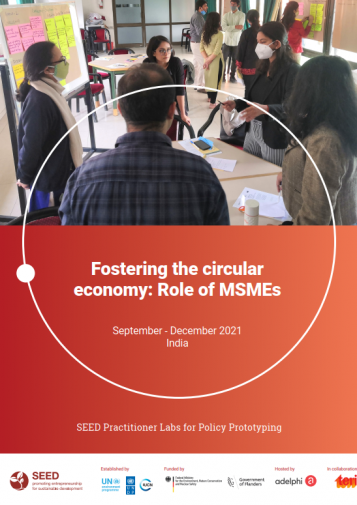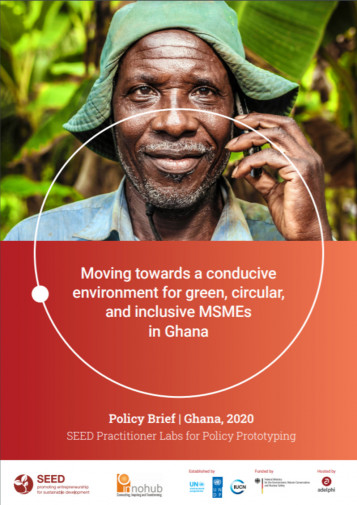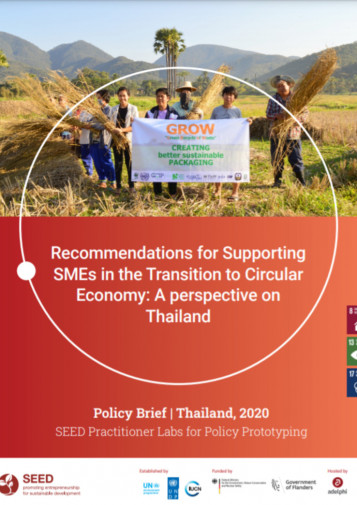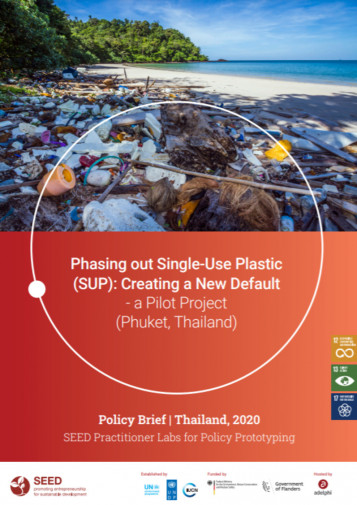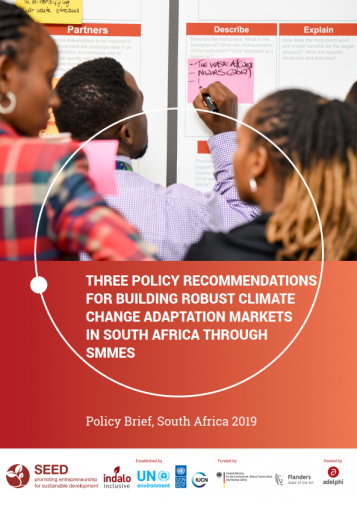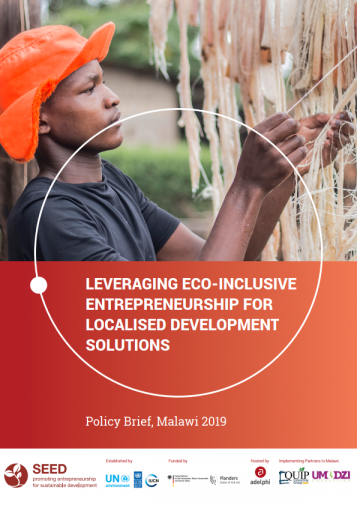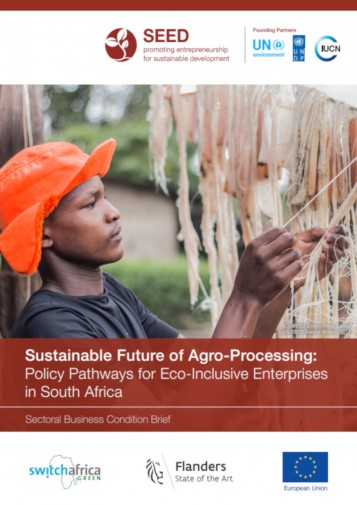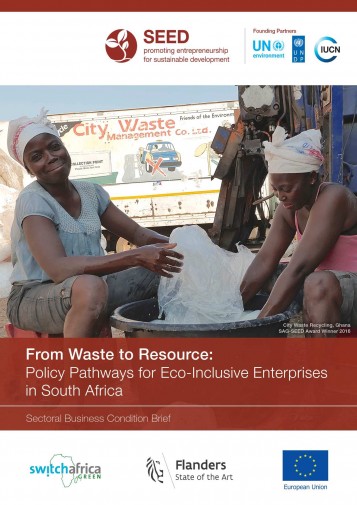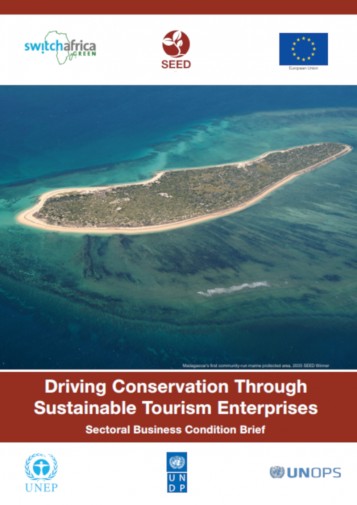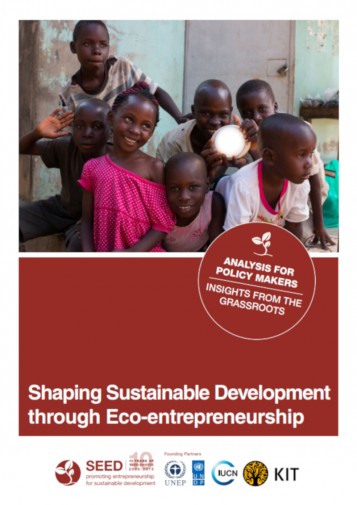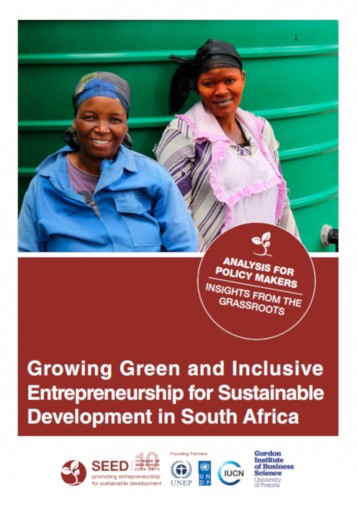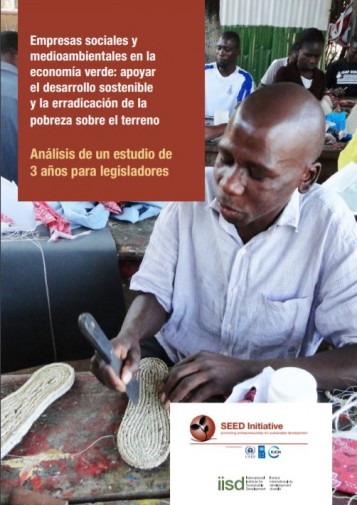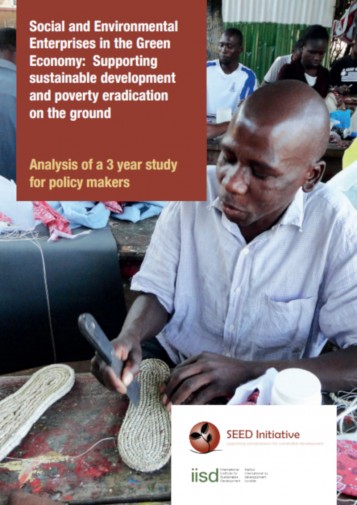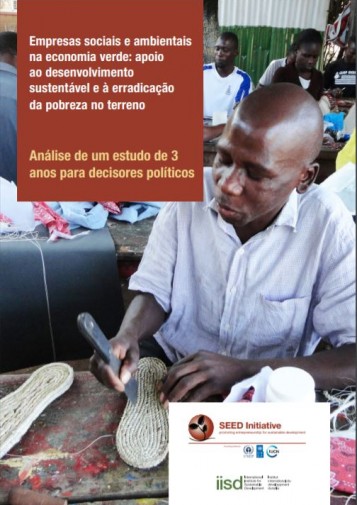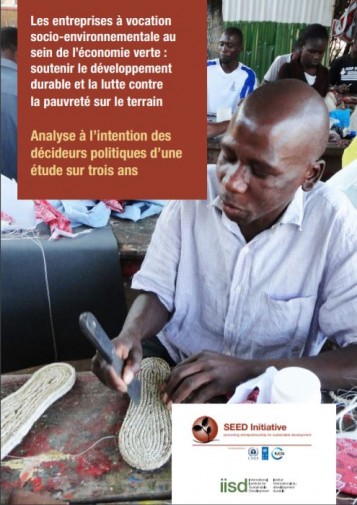Prototypes for the Green Finance Strategy 2021-2030, Uganda
Published: 14 décembre 2022 Sonya Ong
This policy brief highlights three prototypes developed as solutions to accelerate green finance flows in Uganda, and serve as inputs to the new Uganda Green Finance Strategy developed by the National Planning Authority. En savoir plus
SDG's:





Sustainable Local Procurement | Policy Brief Indonesia (Bahasa Indonesia)
Published: 01 décembre 2022 Ade Afrilian, Camilla Shearman, Ivy Londa, Rizky Anugrah
Keterlibatan UMKM lokal yang menyediakan barang dan jasa berkelanjutan dalam sistem pengadaan barang dan jasa pemerintah dapat mendorong transisi menuju perekonomian berkelanjutan, memberikan lapangan kerja dan pengembangan ekonomi lokal, serta mempercepat pemulihan dari pandemi Covid-19 En savoir plus
SDG's:





Sustainable Local Procurement | Policy Brief Indonesia
Published: 01 décembre 2022 Ade Afrilian, Camilla Shearman, Ivy Londa, Rizky Anugrah
The involvement of local MSMEs that provide sustainable goods and services in government procurement systems can drive the transition to a sustainable economy, provide job opportunities and local economic development, and accelerate the recovery from the Covid-19 pandemic. En savoir plus
SDG's:





Fostering the circular economy in India: Role of MSMEs
Published: 30 mars 2022 Abdullah Mohammed Atiq, Amar Munnolimath, Mehar Kaur, Shweta Gautam
This policy brief looks at the role of MSMEs in catalysing the circular economy in India, and puts forward some recommendations and policy solution prototypes to support and unlock circular economy entrepreneurship. The recommendations and prototypes were developed as part of the SEED Practitioner Labs for Policy Prototyping in India, 2021. En savoir plus
SDG's:







Moving towards a conducive environment for green, circular, and inclusive MSMEs in Ghana
Published: 25 janvier 2021 Amanda Panella, Camilla Shearman, Doris Awortwi-Tandoh, Kodjo Barnor, Letitia Varney, Thomas Wiredu
This policy brief investigates how green MSMEs face challenges when accessing finance, finding markets, and navigating a dynamic policy landscape and explores how partnerships between policy makers and ecosystem players can help target support of the MSMEs and overcome these barriers. En savoir plus
Recommendations for Supporting SMEs in the Transition to Circular Economy | Thailand, Policy 2020
Published: 07 janvier 2021 Linde Wolters, Sonya Ong, Supapim Wannopas
This Policy Brief from SEED's Practitioner Labs for Policy Prototyping highlights the Stockholm Environment Institute (SEI)'s research on the barriers and challenges faced by the private sector hindering a transition towards sustainable production and adoption of circular economy business models. En savoir plus
SDG's:





Achieving Smart Agriculture Potential through Efficient Data Connectivity and Management | Thailand, Policy 2020
Published: 07 janvier 2021 Sonya Ong, Supapim Wannopas
Download SEED's Thailand 2020 Policy Brief from the Practitioner Labs for Policy Prototyping to read about ListenField's contributions to achieving smart agriculture potential through data connectivity and management. En savoir plus
Phasing out Single-Use Plastic (SUP) Creating a New Default | Thailand, Policy 2020
Published: 07 janvier 2021 Linde Wolters, Sonya Ong, Supapim Wannopas
Phasing out single-use plastics (SUP) in Thailand demands a commitment from different sector stakeholders - the private sector, as producer and purchaser of the material, plays an influential role in providing alternatives and realising sustainable consumption and production. En savoir plus
SDG's:

Three policy recommendations for building robust climate change adaptation markets in South Africa
Published: 28 octobre 2019 Camilla Shearman, Christine Meyer, Sonya Ong
With lessons drawn from an 8-month policy prototyping labs cycle in South Africa and over fifteen years of enterprise support, this policy brief presents three recommendations for policymakers to improve SMME access and contribution to climate change adaptation markets. These recommendations include (1) increasing availability of and access to market information, (2) creating support pipelines between public and private stakeholders, and (3) leveraging intermediaries as key contributors to the implementation and evaluation of market access policies. En savoir plus
SDG's:







Leveraging eco-inclusive entrepreneurship for localised development solutions | Policy Brief Malawi
Published: 21 octobre 2019 Camilla Shearman, Christine Meyer, Maggie Sloan, Marlena Kiefl
In a global context of commitments to sustainable development and the mitigation of and adaptation to climate change, Malawi has set out ambitious agendas to increase resilience to climate change and move towards a green and inclusive economy. Translating these ambitious agendas into impact at the community level requires concerted efforts in the decentralisation of policy initiatives and capacity building of local actors. SMMEs play a key role in aligning local markets to national development goals, and can have a transformational impact on the achievement of these goals. Drawing on discussions from the SEED policy dialogue and labs process in Malawi, this policy brief presents recommendations to policy makers for leveraging the potential of SMMEs to transform the agriculture, waste, and clean energy sectors in Malawi, and across Southern Africa. En savoir plus
SDG's:



Sustainable Future of Agro-Processing: Policy Pathways for Eco-Inclusive Enterprises in South Africa
Published: 01 juin 2018 Christine Meyer, Janet Mkhabela, Maggie Sloan
Innovation of the agro-processing sector has been identified – and supported through policy measures and funding initiatives – as central to the low carbon, inclusive economic transition in South Africa. Small and medium-sized eco-inclusive enterprises in the sector play a pivotal role in mitigating the impacts of climate change and tackling poverty and social inequalities. En savoir plus
SDG's:





From Waste to Resource: Policy Pathways for Eco-Inclusive Waste Enterprises in South Africa
Published: 08 mars 2018 Christine Meyer, Janet Mkhabela, Maggie Sloan
This sectoral policy brief provides an short overview to policy-makers and practitioners of the common challenges faced by eco-inclusive enterprises in this strategic sector in South Africa. The brief is designed to guide policy-makers and practitioners in the prototyping and implementation of measures to ensure the success and scaling-up of eco-inclusive enterprises in South Africa. En savoir plus
SDG's:







Driving Conservation Through Sustainable Tourism Enterprises: A Sectoral Business Condition Brief
Published: 01 septembre 2016 Dr. Christina Tewes-Gradl, Mariska van Gaalen
To protect biodiversity, we need to create alternative economic opportunities for the people who depend on the world’s most biodiverse ecosystems. Biodiversity is the foundation of human well-being and prosperity. At the same time, human activities are its greatest threat. In particular, biodiversity hotspots like savannahs, forests and coral reefs are under pressure due to unsustainable tourism development and the livelihood needs of low-income communities. En savoir plus
SDG's:





Scaling Innovation at the Energy-Agriculture Nexus in East Africa: A Sectoral Business Condition Brief
Published: 01 septembre 2016 Allison Robertshaw, Amélie Heuër, Christian Pirzer, Christine Meyer, Dr. Christina Tewes-Gradl, Jona Liebl
Energy and agriculture form a nexus. On one hand, energy can be generated by using crops, agricultural residues, and livestock waste. On the other hand, substantial amounts of energy are required along the agricultural and food processing value chain, accounting for around 30 % of the global energy consumption. En savoir plus
SDG's:







Shaping Sustainable Development through Eco-entrepreneurship
Published: 01 septembre 2015 Amélie Heuër, Bart Slob, Helena Posthumus, Rainer Agster, Roger Bymolt
Small, micro and medium enterprises (SMMEs) that pursue a triple bottom line approach offer one concrete means of achieving this shift to a Green Economy. This report highlights grassroots eco-enterprises, the types of impact they are achieving and the challenges and opportunities they face. En savoir plus
SDG's:









Growing Green and Inclusive Entrepreneurship for Sustainable Development in South Africa
Published: 01 septembre 2015 Amélie Heuër, Dr. Mira Slavova, Rainer Agster
SEED has worked closely with the Gordon Institute for Business Science in 2015 on a study that integrates for policy-makers the findings of five case studies in South Africa. As concerns with accomplishing SDG goals have become inextricably lodged within social and policy debates, scholars studying SMMEs have developed understandings of enterprises embedded within complex institutional environments. The current study has looked how SEED Winners in South Africa progress in achieving their triple bottom line objectives, taking into account challenges they encounter along the way, and success factors that have enabled them to move forward. En savoir plus
SDG's:







Empresas sociales y medioambientales en la economía verde: apoyar el desarrollo sostenible y la erradicación de la pobreza sobre el terreno Análisis de un estudio de 3 años para legisladores
Published: 01 mai 2012 Gabriel Huppé, Heather Creech, Leslie Paas, Vivek Voora
SEED ha trabajado estrechamente con el Instituto Internacional para el Desarrollo Sostenible (IIDS) desde 2007 en un programa de investigación para aumentar el conocimiento técnico y la comprensión de las pequeñas empresas sociales y ambientales. Sobre la base de la investigación y las consultas de los simposios, SEED pudo publicar el siguiente Análisis para los responsables de la creación de políticas, que ofrecen nuevas perspectivas sobre el papel de las microempresas y las pequeñas empresas sociales y ambientales como actores esenciales en la construcción de economías verdes. En savoir plus
SDG's:







Social and Environmental Enterprises in the Green Economy: Supporting sustainable development and poverty eradication on the ground - Analysis of a 3 year study for policy makers
Published: 01 mai 2012 Gabriel Huppé, Heather Creech, Leslie Paas, Vivek Voora
SEED has worked closely with the International Institute for Sustainable Development (IISD) since 2007 on a programme of research to increase technical knowledge and understanding about small-scale social and environmental enterprises. Based on the research and Symposia consultations, SEED was able to publish the following Analysis for Policy Makers, which provides new insights into the role of micro and small social and environmental enterprises as essential actors in building green economies. En savoir plus
SDG's:







Empresas sociais e ambientais na economia verde: apoio ao desenvolvimento sustentável e à erradicação da pobreza no terreno Análise de um estudo de 3 anos para decisores políticos
Published: 01 mai 2012 Gabriel Huppé, Heather Creech, Leslie Paas, Vivek Voora
SDG's:







Les entreprises à vocation socio-environnementale au sein de l’économie verte : soutenir le développement durable et la lutte contre la pauvreté sur le terrain : Analyse à l’intention des décideurs politiques d’une étude sur trois ans
Published: 01 mai 2012 Gabriel Huppé, Heather Creech, Leslie Paas, Vivek Voora
SEED a travaillé en étroite collaboration avec l'Institut international du développement durable (IIDD) depuis 2007 sur un programme de recherche pour améliorer les connaissances techniques et la compréhension de petites entreprises sociales et environnementales. Sur la base des consultations de recherche et des symposiums, SEED pouvait publier l'analyse suivante pour les décideurs, qui offre de nouvelles perspectives sur le rôle des entreprises sociales et environnementales micro et petites comme des acteurs essentiels dans la construction d'économies vertes. En savoir plus
SDG's:








